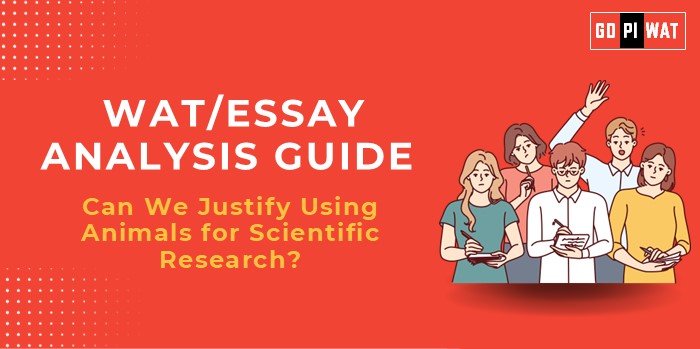📋 Written Ability Test (WAT)/Essay Analysis Guide: Can We Justify Using Animals for Scientific Research?
🌍 Understanding the Topic’s Importance
Animal testing straddles science and ethics, posing dilemmas around progress versus compassion. An essay on this reflects critical thinking and ethical reasoning – skills vital for business leaders.
⏳ Effective Planning and Writing
- 🕒 Time Allocation:
- Planning: 5 minutes
- Writing: 20 minutes
- Review: 5 minutes
- 📊 Preparation Tips:
- Note key statistics and case studies.
- Identify ethical and scientific arguments.
💡 Introduction Techniques for Essays
- ⚖️ Contrast-Based: “Animal testing has saved millions of lives but also taken countless ones. Can we ethically justify it in modern science?”
- 🔗 Solution-Oriented: “With advancements in alternatives, is it time to phase out animal testing while maintaining scientific progress?”
🏗️ Structuring the Essay Body
- Paragraph 1: Achievements
- Paragraph 2: Challenges
- Paragraph 3: Future Outlook
Discuss breakthroughs enabled by animal research, e.g., vaccines for polio and rabies.
Explore ethical dilemmas, high costs, and efficacy gaps.
Highlight alternative technologies, global regulations, and ethical practices.
📄 Concluding Effectively
- ⚖️ Balanced: “While animal testing remains crucial for medical science, its future must align with humane and effective alternatives.”
- 🌍 Global Perspective: “Countries leading in alternatives show that innovation and compassion can coexist in science.”
✍️ Sample Short Essays (100 Words Each)
1. Balanced Perspective:
“Animal testing has led to medical breakthroughs, yet its ethical implications remain contentious. Moving forward, science must balance innovation with compassion, exploring alternatives to minimize harm.”
2. Solution-Oriented:
“With billions invested in alternative methods, the era of animal testing could soon end. Ethical science lies in adopting innovative tools that ensure both safety and compassion.”
3. Global Comparison:
“Norway’s strides in alternative testing exemplify ethical science. By reducing reliance on animals, they inspire a future where progress is both humane and effective.”


